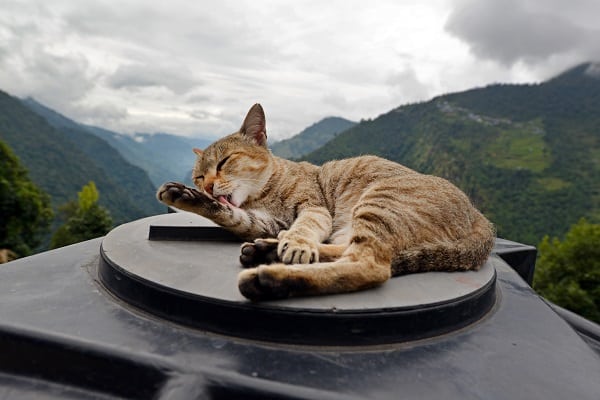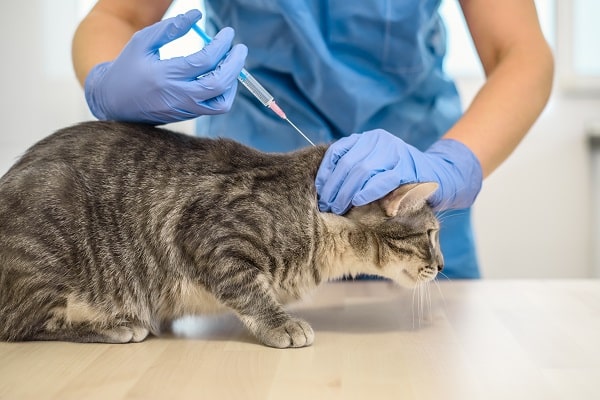Not eating is a common concern among cat owners, especially if your feline friend is typically a hearty eater. When a cat suddenly stops eating or loses their appetite, it can indicate an underlying health issue or behavioral problem. And as a pet owner, it’s important to understand the potential causes of why this is happening and take appropriate action to ensure their well-being. In this article, you will get an in-depth look at some of the most common reasons your cat is not eating and tips and advice on encouraging them to start eating again.
How Much Should Your Cat Be Eating?
Feeding cats seems like a straightforward task, but figuring out how much and how often can be tricky. Proper nutrition is essential to keep cats healthy, active, and playful. The amount of food a cat needs depends on several factors, such as age, weight, activity level, and overall health. Kittens and pregnant or nursing cats require more calories than adult cats, while senior cats may need fewer.
A healthy adult cat typically needs around 250-300 calories per day, divided into small meals over the course of the day. Measuring the food and feeding them at regular intervals can help prevent overfeeding and obesity, which can lead to serious health problems. Consult with your veterinarian to create a personalized feeding plan for your feline friend.
Reasons Your Cat Is Not Eating
If that’s not the case and your cat suddenly stops eating, there may be an underlying problem. In most cases, it’s best to take them to the vet for a checkup before trying any home remedies. Here are some of the common causes of a sudden loss of appetite in cats:
Stress

Stress can have a significant impact on your life, and it turns out that it’s not just limited to humans. Cats can also experience stress, affecting their behavior in various ways. One common way that stress shows up in cats is through decreased appetite. When a cat is stressed, they may become lethargic, lose interest in their food, and even stop eating altogether.
This can be a cause for concern, as a lack of food can lead to a range of health problems. If you notice that your cat has suddenly stopped eating, it’s essential to try and identify the source of their stress and help them to feel calmer and more secure.
Tooth Pain

When your feline friend experiences tooth pain, it can cause a slew of other health problems. One of the most common issues is that they stop eating. This can quickly lead to weight loss and malnutrition. As a responsible pet owner, you need to be aware of the symptoms of tooth pain in cats, such as avoiding food or chewing only on one side of the mouth.
If you suspect your cat is experiencing tooth pain, don’t hesitate to take them to a veterinarian for a checkup. Early treatment can help prevent complications and ensure your cat stays healthy and well-fed.
Kidney Disease

Another possible reason for a decreased appetite in cats is kidney disease. This condition is particularly common in older cats and can have severe consequences if left untreated. The kidneys are responsible for removing waste products from the body and regulating fluid levels, so when they begin to malfunction, your cat may suffer from a range of symptoms.
One of the earliest signs of kidney disease is a loss of appetite. If you notice that your cat is not eating as much as usual, as well as other signs such as vomiting, drinking more water than usual, or an increase in urination, it’s best to take them to the vet for a checkup.
Pancreatitis

If your cat suddenly stops eating, it could also be a sign of pancreatitis. This condition occurs when the pancreas becomes inflamed, causing digestive enzymes to leak into the abdominal cavity. Symptoms of pancreatitis in cats include abdominal pain, vomiting, and diarrhea. If left untreated, pancreatitis can lead to serious health complications such as diabetes.
It’s essential to seek veterinary care immediately if you suspect your cat may be suffering from pancreatitis. Your vet can provide proper treatment and nutritional support to help your cat recover from this condition and regain their appetite.
Digestive Obstruction

Cats are naturally finicky eaters, but when they start refusing food altogether, you need to take notice. It could be a sign of a digestive obstruction, which is a serious health issue for your feline. This occurs when something blocks the path of food through the digestive system, leading to discomfort, pain, and even organ damage. Common culprits include hairballs, foreign objects, and certain medical conditions.
As a result, your cat may start vomiting, lose weight rapidly, and become lethargic. If you suspect your cat may have a digestive obstruction, it’s vital to seek veterinary attention right away. Early intervention can differentiate between a speedy recovery and serious long-term health consequences.
Vaccination

While it’s a bit more rare than some of the other causes on this list, some cats may experience a lack of appetite as a side effect of vaccination. This is because their immune system is working hard to build up immunity against the disease they were vaccinated against. The good news is that this usually only lasts a few days, and most cats will return to their normal eating habits.
In the meantime, monitoring your cat’s food and water intake and consulting with your veterinarian if you have any concerns is important. Keeping your cat healthy and happy is always a top priority, and being aware of this potential side effect can help you provide the best care possible.
Cancer

Finally, arguably the most concerning of the conditions listed here is cancer. This can present itself in a variety of ways, including loss of appetite. Other signs to watch out for include unexplained weight loss, lumps or bumps on the body, vomiting, or excessive drinking.
If your cat displays any of these symptoms, it’s essential to take them to the vet immediately for a checkup and proper diagnosis. Early detection is key when it comes to treating cancer in cats, so don’t wait if you suspect something is wrong.
Be Aware Of The Potential Reasons Your Cat Is Not Eating
Understanding the different reasons your cat is not eating is the first step in providing the best care for your feline companion. From kidney disease to cancer, a range of health issues can cause a loss of appetite. If you notice any signs or symptoms, it’s best to take your cat to the vet immediately for proper diagnosis and treatment. With early intervention and proper care, you can help your cat make a full recovery.